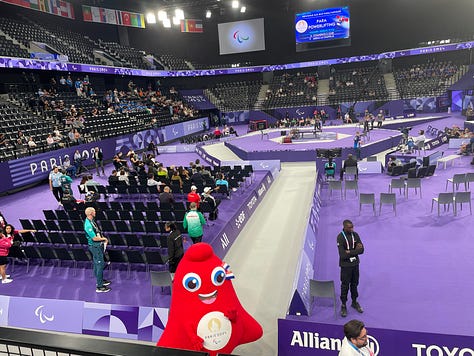Welcome back to The Angle 👋 It’s been quite the hiatus… 😅



Dear reader, I would like to write to you and tell you that I spent the rest of summer doing many fabulous things — for work and pleasure — and that I couldn’t tear myself away from them to write this newsletter.
But that wouldn’t be true.
There was some fabulous moments in August and September. I made my annual pilgrimage to the Edinburgh Fringe and, once again, I am left mulling whether I should invest in improv classes, though the journalist to improv pipeline is almost too cliche at this point.
And I made an impromptu solo trip to the Paralympics in September. (I did say in my last newsletter that I would be obsessed by both the Paralympics and Olympics.)
The whirlwind trip was very Emily in Paris. Most people spoke to me in French and I simply nodded, hoping for the best, as I zipped from venue to venue. I was one of the 8% of international buyers for Paralympics tickets. And of course, I was very much charmed by Phryge. Paralympic Phryge, unlike Olympic Phryge, is “a party animal, spontaneous and a bit hotheaded.”
The trips only partly stopped me from writing the newsletter over the past two months; the more dominant reason is laziness.
I’ve had nothing to say.
It’s embarrassing to admit when your job is dependent on having something to say. I’ve had many fleeting thoughts, but nothing of note. Nothing worthy enough to inflict on you, my small community of subscribers, in the form of an essay.
Having nothing to say has also resulted in me perusing more journalism job postings lately. After a string of no responses to pitches, I am left wondering if I am losing my touch? Maybe I would benefit, once again, from the constraints of having a beat?
Wouldn’t life be easier if I could send a two sentence story description over Slack that gets approved near instantly, rather than writing a carefully crafted pitch that fades into the ether?
But, then, isn’t applying for a job just as painful?
When pitching, you will at least — probably — get paid if you secure a commission. It might take four weeks. It might take six months. (It always depends on the invoicing system, right?) But you will most likely get paid.
A response to a job application just means the start of hours of unpaid labor. The personalized cover letter, the edit tests, and the multi-round interviews.
And that’s if you get a response…
I have a belief — and I could be totally wrong — that beyond entry-level roles no one ever looks at these applications if you are applying completely cold.
I have only ever gotten journalism jobs through connections and warm intros. (There’s one exception to this rule). It seems if you want to be in the running for a next-level job in journalism then you better hope the hiring editor, or one of their work colleagues or friends, invites you to apply.
I’ve been burnt one too many times from hours of unpaid labor on job applications that never get a response.
“Email in bio. DM with any questions!!!”
“If you want to know more drop me a line!”
As a freelancer, time is money. I can’t afford to spend hours on applications that will inevitably go nowhere when I could instead be pitching or networking. So I’ve started doing a little test…
If a job posting, usually posted directly by the hiring manager, piques my interest, I send a short and thoughtful question about the position with a brief two line intro on myself. If the hiring editor doesn't reply to the question then they probably already have a name, or short-list of names, in mind and I don't apply for the job.
I’ve found the more overly enthusiastic the post is on social media, the less likely the hiring editor will ever actually reply.
You are probably thinking: “You must be applying for roles you are unqualified for.” I might not be the perfect candidate, but I certainly know I have enough skills and experience to at least warrant an answer to my question or confirmation of receipt of my application.
Maybe, instead, you are thinking this feels familiar…
I am curious to know if this strikes a chord with any other journalists or if I am completely off base. I have created a very informal survey to hear what others think on the topic of cold applying for jobs in the industry. I’d love for it to be shared around with journos and ex-journos. The survey is focused on next-level jobs rather than entry-level where I believe applications are still taken into account. I am not sure what I will do with the responses. If I get enough data then I will likely do some sort of follow up exploring this topic in more depth.
If we are seeing the death of the cold application in journalism then it’s a sad state of affairs .
Maybe it’s not even the death of the cold application. Maybe job applications have never really been a thing when it comes to next-level jobs in journalism.
I know when I decided to leave my cozy tech career to study journalism, I was told I could never break in because of the class divide. (Most journalists who can stomach the industry’s poor pay in the UK are relying on the bank of mum and dad.)
Around 80% of journalists in the UK come from professional and upper-class backgrounds, which is twice the rate of the overall workforce in the UK, according to a 2022 survey from NCTJ. A report examining those results notes that “Oxford and Cambridge function essentially as feeder schools for large tranches of the British media in London.”
As you might have guessed, I do not fall into the 80% and I didn’t goto Oxbridge. Funnily enough I’ve only ever written for one UK-based publication. Read into that what you will…
As newsroom shrink, the lack of opportunities to apply cold to journalism jobs will have a detrimental effect on diversity of content. We will see the same few journalists rotate between similar jobs across the leading publications, while others struggle to get their foot in the door.
Even with a foot in a door, it seems harder than ever to find room to manoeuvre in this industry. As newrooms shrink, its harder to get the chance to experience new beats within an organization, meanwhile, it seems near impossible to try a new beat outside the organization without taking a significant paycut and going right back to the start with entry level positions or internships. (Again working in the favor of those with an account at the bank of mum and dad or a well endowed partner.) Freelancing is an option, but it comes with its own challenges, especially amid a cost of living crisis.
At the same time, can we blame editors for taking shortcuts and betting on a known quantity rather than a diamond in the rough? Newsrooms are shrinking after all.
I’d love to hear your thoughts in my survey and please share it with others!
— Kari



